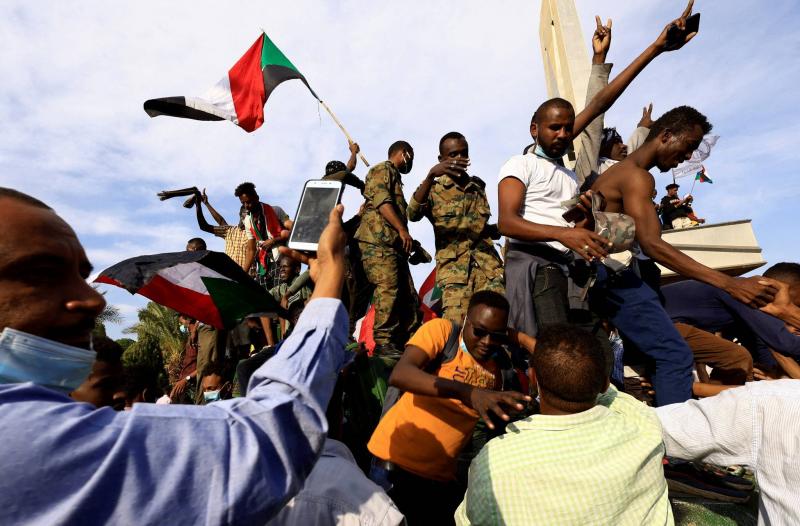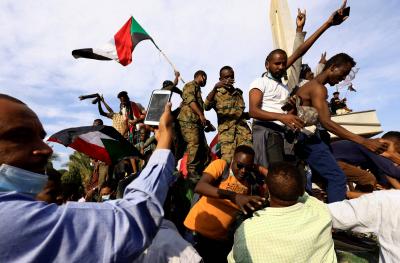Residents in Khartoum reported hearing intermittent sounds of fighting between the parties involved in the Sudanese conflict in the capital on Monday after a U.S.-Saudi brokered ceasefire agreement lasting a week sparked hopes for some de-escalation in the fighting that has persisted for five weeks.
The ceasefire agreement, signed by the army and the Rapid Support Forces following talks in Jeddah, Saudi Arabia, is set to take effect on Monday evening and will be subject to an internationally supported monitoring mechanism. It also allows for the delivery of humanitarian aid. Previous ceasefire agreements since the conflict began on April 15 have failed to halt the fighting, but the Jeddah agreement represents the first time that both sides signed an armistice after negotiations. Analysts say it remains unclear whether army chief General Abdel Fattah al-Burhan or Rapid Support Forces leader Mohamed Hamdan Dagalo, known as Hemedti, can implement the ceasefire effectively on the ground. Both have previously indicated that they seek victory, and neither has traveled to Jeddah.
The Security Council held a session on Monday in New York to discuss developments in Sudan, where UN Special Envoy for Sudan Volker Perthes called for an immediate ceasefire, noting that over 190 children have died in the conflict and more than a million people have been displaced. The envoy emphasized that neither side has adhered to the laws of war, targeting civilians and civilian facilities, describing this as a violation of international humanitarian law, and warned of the risks of tribal warfare. He stressed the need to protect civilians, allow safe passage for them, adhere to the truce, and transition toward dialogue.
African Union Commissioner Bankole Adeoye noted that external interventions have undermined the transitional period in Sudan, praising Saudi Arabia's role in reaching the truce agreement. IGAD representative Workneh Gebeyehu expressed sadness over the interruption of essential services in Sudan, leaving the population in a tragic state. He mentioned ongoing discussions for settlements in coordination with South Sudan and indicated that the only path to halt the fighting as soon as possible is to pursue a common goal and regional cooperation to support the Sudanese people toward achieving lasting peace.
Sudan's UN representative, Al-Harith Al-Harith, stated that the ceasefire agreement covers all regions and highlighted the coordination of relief operations with humanitarian organizations through the Port Sudan airport along safe corridors. He spoke about the burning of 27 banks and several markets by militias, as well as 16 factories, and reported over 50 incidents targeting diplomatic missions. The representative urged the international community to condemn the attacks on government institutions, civilians, and diplomatic missions. He added that over 3,568 Sudanese have arrived in Ethiopia since the fighting began.
Hemedti’s advisor, Hafiz Al-Zein, denied rumors about the death or injury of Mohamed Hamdan Dagalo "Hemedti." He announced that Hemedti is personally leading the battles in Omdurman, Bahri, and Khartoum. Hemedti confirmed in a voice message that his forces will not leave the positions they have occupied since the fighting erupted on April 15, claiming that the army executed a "coup" against the Rapid Support Forces. He further stated that his forces are lawfully stationed to protect hospitals and provide services to medical staff and residents, asserting that claims to the contrary are intended to undermine the Rapid Support Forces.
The conflict has resulted in 1.1 million people fleeing their homes, both within the country and to neighboring nations, exacerbating a humanitarian crisis that threatens regional stability. Those who remain in Khartoum face struggles for survival amid rampant looting, the collapse of health services, and dwindling supplies of food, fuel, electricity, and water. Witnesses reported clashes in central and southern Khartoum on Sunday. Safaa Ibrahim, a 35-year-old employee living in Khartoum, expressed hope that the agreement would end the conflict, stating, "We wish for the success of this agreement; we are tired of this war and have been displaced from our homes to outside Khartoum, with families scattered between cities in Sudan and Egypt... we want to return to normal life and safety. Al-Burhan and Hemedti must respect the people's desire for life."
The war in Khartoum erupted due to disagreements between the leaders of the two warring factions who seized power in a coup in 2021, concerning the transitional phase that was supposed to lead to elections overseen by a civilian government. Al-Burhan served as the head of the Sovereignty Council while Hemedti was his deputy following the ousting of former President Omar al-Bashir during a popular uprising in 2019. Discussions in Jeddah focused on allowing humanitarian access and restoring essential services. Mediators indicate that further talks are needed to withdraw forces from urban areas to conclude a lasting peace agreement involving civilian powers.
Mohamed Hamid, a political activist in the capital, said residents of Khartoum are awaiting the ceasefire and the opening of humanitarian corridors, adding that the health situation is worsening day by day. Major General Yasser Al-Atta, a member of the Sovereignty Council, stated on state television that the army is trying to drive the Rapid Support Forces out of homes, schools, and hospitals. Millions of civilians have found themselves besieged as the army resorts to airstrikes and shelling to target Rapid Support Forces which have spread in residential areas since the conflict began. When asked about calls from some tribal leaders to arm civilians, Al-Atta remarked that the current situation does not require civilians to be armed; however, he acknowledged that given the ongoing rapes and attacks on citizens' homes and their properties, those who wish to defend themselves have the right to do so.
Since the outbreak of the conflict, unrest has extended to other parts of Sudan, especially the Darfur region in the west. Approximately 705 people have been killed and at least 5,287 injured, according to the World Health Organization, although the actual death toll is believed to be much higher.




